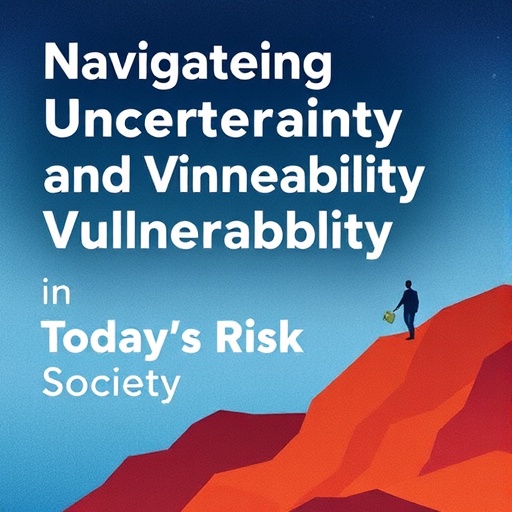In today’s world, the notion of permanence seems elusive, particularly as we navigate a landscape marked by unprecedented uncertainty and vulnerability. The research presented by R. Marta in the insightful article “Permanent uncertainty and social vulnerability in contemporary risk society” explores the pervasive impact of risk on social fabric. It sheds light on how individuals and communities respond to the constant state of flux while grappling with the consequences of social vulnerability.
As the foundations of modern living are intricately tied to socio-political and economic structures, Marta emphasizes that the global risk society is emblematic of a disjointed reality. The advancements in technology and globalization have ushered in an era where risks are not just external but internalized within social mechanisms. The interplay between uncertainty and risk is not merely an academic exploration but a palpable reality affecting how societies are structured and how individuals within those societies perceive their own stability.
Exploring the theme of permanent uncertainty, the article delves into the psychological ramifications that accompany living in a risk society. The feeling of insecurity permeates various strata of society, influencing mental health and overall well-being. The study articulates that the persistent fear of the unknown leads to an atmosphere of anxiety as individuals struggle to navigate their lives in an unpredictable environment. This phenomenon has been exacerbated by global crises, such as pandemics, economic downturns, and climate change, which reinforce the narrative of vulnerability.
Marta argues that social vulnerability is not equally distributed across populations. Factors such as socioeconomic status, access to resources, and demographic characteristics play a significant role in determining how individuals experience risk. Consequently, marginalized groups often bear the brunt of uncertainties inherent in risk society. The disparities in how people cope with or adapt to these uncertainties reveal a deeper layer of injustice within social structures.
The concept of risk society, as framed by sociologist Ulrich Beck, is built on the premise that modernity is characterized by a heightened awareness of the risks that accompany technological and societal progress. Marta takes this idea further, positing that the awareness of risk becomes a social construct that influences people’s decisions, behaviors, and interactions. The relentless media focus on risks can create a feedback loop, amplifying fear and, in turn, leading to more significant perceived vulnerabilities.
Marta’s research also tackles the role of information technology in shaping the landscape of risk perception. In our digital age, the circulation of information can exacerbate feelings of vulnerability, with social media acting as a double-edged sword. On one hand, it provides platforms for raising awareness about risks and mobilizing communities; on the other hand, it can contribute to the spread of misinformation, further entrenching uncertainty and fear among the public.
The article also highlights a critical observation: the disconnect between governmental responses to crises and the lived experience of the populace. While policymakers implement strategies intended to minimize risk, these measures often fail to address the immediate realities faced by vulnerable groups. This dissonance can lead to disenchantment with institutions, marginalizing individuals even further in their struggle for stability.
Examining potential pathways forward, Marta stresses the importance of community resilience in countering the effects of uncertainty. By fostering strong social ties and networks, communities can cultivate solidarity in the face of adversity. This collective approach not only aids in navigating risks but also empowers individuals to reclaim agency over their circumstances, thus lessening the impact of vulnerability.
Furthermore, the research underlines the significance of education in building awareness about risk and fostering critical thinking. An informed populace is better equipped to understand and respond to uncertainties, thereby mitigating feelings of helplessness. Marta advocates for educational initiatives that harness the power of knowledge to create a more resilient society, prepared to face the challenges of a risk-laden world.
Additionally, the intersection of climate change and social vulnerability becomes an urgent focal point in the article. As environmental risks become more pronounced, the need for sustainable practices and policies becomes critical. Marta argues that addressing climate-related risks cannot be isolated from broader social vulnerabilities, as the fallout from environmental degradation disproportionately impacts disadvantaged communities.
The research also extends beyond theoretical analysis, providing a framework for understanding the implications of risk on policy-making. Emphasizing the necessity for adaptive governance, Marta points out that the ability to respond to emerging risks requires a shift in perspective and strategy. Policymakers must be agile and inclusive in their approaches, ensuring that the voices of marginalized populations inform risk management practices.
Moreover, the interplay of individual agency and systemic structures emerges as a vital conversation in Marta’s work. Empowering individuals to understand their circumstances leads to more localized approaches to risk management. The relationship between personal agency and societal structures must be continually examined to foster an environment where resilience can thrive.
The dialogue surrounding permanent uncertainty and social vulnerability is far from complete. In drawing connections between theoretical frameworks and real-world implications, Marta opens the door to further discourse on the nature of risk in contemporary society. As we continue to navigate a landscape fraught with uncertainties, the research serves as a poignant reminder of our collective responsibility to understand and address the vulnerabilities within our communities.
This scrutiny of risk society should not merely serve academic interests; it must act as a catalyst for change. The insights gleaned from Marta’s research can stimulate conversations on individual empowerment, community building, and systemic reform essential for thriving in an ever-uncertain world. Ultimately, fostering resilience against uncertainty is not just an aspiration, but a necessity for building sustainable futures where all communities can flourish despite the odds.
Subject of Research: Social vulnerability in contemporary risk society
Article Title: Permanent uncertainty and social vulnerability in contemporary risk society
Article References:
Marta, R. Permanent uncertainty and social vulnerability in contemporary risk society.
Discov glob soc 3, 124 (2025). https://doi.org/10.1007/s44282-025-00277-3
Image Credits: AI Generated
DOI: https://doi.org/10.1007/s44282-025-00277-3
Keywords: uncertainty, social vulnerability, risk society, resilience, community empowerment, climate change, information technology, policy, systemic structures, awareness, education




